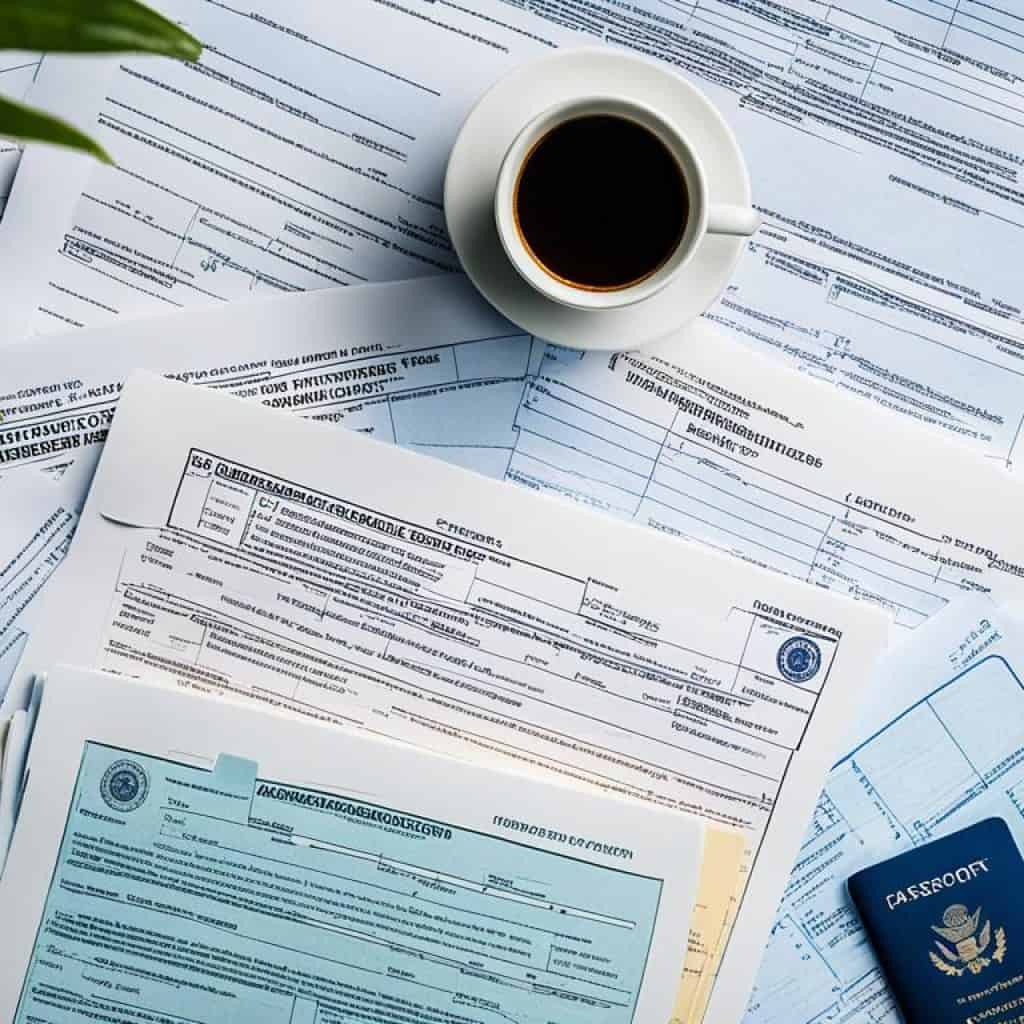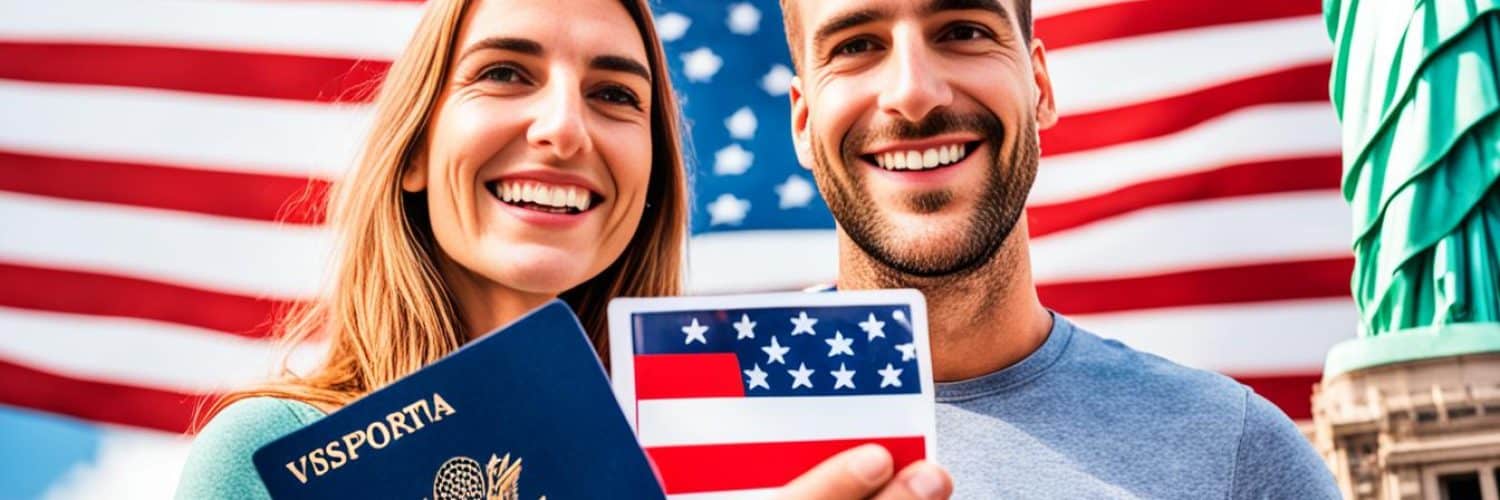Are you planning to bring your foreign spouse to the United States? Whether you are a U.S. citizen or a Lawful Permanent Resident (LPR), there are options available for you to obtain a marriage visa and unite with your spouse in the land of opportunity. But how does the process work? What documents do you need? And what are the requirements?
In this comprehensive guide, we will walk you through the marriage visa process, including the different types of marriage visas, the eligibility criteria, documentation requirements, application process, and more. By the end, you’ll have a clear understanding of what it takes to bring your spouse to the USA and start your new life together.
Key Takeaways:
- There are two types of marriage visas available: the immigrant visa (IR1 or CR1) and the nonimmigrant visa (K-3).
- To be eligible for a marriage visa, the petitioner must be a U.S. citizen, the couple must be legally married, and the authenticity of the marriage must be proven with documentation.
- The marriage visa application process involves filing a petition, submitting the necessary documentation, paying fees, and attending a visa interview.
- Required documents for a marriage visa application include a valid passport, marriage certificate, completed visa application forms, and an Affidavit of Support.
- The marriage visa interview is a crucial step in the application process, where the authenticity of the marriage and the eligibility of the applicant are determined.
Types of Marriage Visas
When it comes to bringing your foreign spouse to the United States, there are two main types of marriage visas available: the immigrant visa (IR1 or CR1) and the nonimmigrant visa (K-3).
An immigrant visa is designed for spouses of U.S. citizens and requires filing a Petition for Alien Relative (Form I-130). This visa category allows your spouse to enter the United States as a lawful permanent resident.
On the other hand, a nonimmigrant visa is for spouses of U.S. citizens and is filed in the country where the marriage took place. This visa category requires the submission of both Form I-130 (Petition for Alien Relative) and Form I-129F (Petition for Alien Fiancé). It allows your spouse to enter the United States while their immigrant visa application is being processed.
Both visa types have their own unique requirements and benefits. It’s important to understand the differences between them and choose the one that best suits your situation.
Table: Comparison of Marriage Visa Types:
| Visa Type | Requirements | Benefits |
|---|---|---|
| Immigrant Visa (IR1/CR1) | File Form I-130 (Petition for Alien Relative) | Allows spouse to enter as a lawful permanent resident |
| Nonimmigrant Visa (K-3) | File both Form I-130 and Form I-129F | Allows spouse to enter the U.S. while awaiting immigrant visa processing |
Sources: First source, Second source
Marriage Visa Requirements
To be eligible for a marriage visa, certain requirements must be met. Here is an overview of the eligibility criteria, documentation needed, and the overall process.
Eligibility for Marriage Visa
In order to apply for a marriage visa, the petitioner must be a U.S. citizen. Green card holders are not eligible to petition for a marriage visa. Additionally, the couple must be legally married. This means the marriage must be recognized as valid and legal in the jurisdiction where it took place.
Marriage Visa Documentation
The documentation required for a marriage visa includes:
- A valid passport for the foreign spouse
- A copy of the marriage certificate or license
- Proof of any prior marriages for both spouses, such as divorce decrees or death certificates
- Financial documentation to demonstrate the petitioner’s ability to support the foreign spouse
- Photographs depicting the married couple together
Marriage Visa Process
- Filing a petition: The first step in the marriage visa process is filing a petition with the United States Citizenship and Immigration Services (USCIS). The petitioner submits Form I-130, Petition for Alien Relative, along with the required supporting documents.
- Submitting documentation: Once the petition is approved, the petitioner must submit the necessary documentation to the National Visa Center (NVC) or the U.S. embassy or consulate where the visa will be processed.
- Attending a visa interview: The foreign spouse will be required to attend a visa interview at the U.S. embassy or consulate. The purpose of the interview is to verify the authenticity of the marriage and assess the eligibility of the applicant.
- Medical examinations: Before the visa is issued, the foreign spouse must undergo a medical examination to ensure they meet the health requirements for entry into the United States.
The specific requirements and documentation needed may vary depending on the type of visa being applied for, such as the CR1 or K-3 visa. It is important to consult official sources or seek professional legal advice to ensure that all necessary steps and documents are completed correctly.
| Required Documentation | Additional Information |
|---|---|
| Valid passport for the foreign spouse | – |
| Copy of marriage certificate or license | – |
| Prior marriage documentation | Include divorce decrees or death certificates, if applicable |
| Proof of financial support | Submit documents such as tax returns, pay stubs, or bank statements |
| Photographs of the married couple | Include pictures that showcase the authentic relationship |
By meeting the eligibility requirements and submitting the required documentation, couples can navigate the marriage visa process with confidence and increase their chances of obtaining a visa for the foreign spouse.
Spouse Visa Application Process
Applying for a spouse visa involves a series of steps to ensure a smooth and successful application process. Here is a breakdown of the spouse visa application process:
- File a petition: The petitioner, who is usually the U.S. citizen spouse, must file Form I-130 with the United States Citizenship and Immigration Services (USCIS). This form serves as a request to establish the relationship between the petitioner and the foreign spouse.
- Submit necessary documentation: Along with the petition, the petitioner must provide supporting documents to prove the authenticity of the marriage. This includes a valid marriage certificate, evidence of joint financial assets or liabilities, and any other relevant documentation.
- Pay fees: There are specific fees associated with the spouse visa application process. These fees may vary but typically include filing fees for the petition and additional fees for processing the application. It is important to review the USCIS website for the most up-to-date fee information.
- Attend a visa interview: After the petition is approved, the applicant will be instructed to attend a visa interview at the U.S. Embassy or Consulate in their home country. This interview is conducted to assess the authenticity of the marriage and the eligibility of the applicant. It is essential to prepare for the interview by reviewing the required documentation and practicing potential interview questions.
By following these steps and providing accurate and complete information, couples can increase their chances of a successful spouse visa application. It is advisable to consult reliable sources and, if needed, seek the guidance of an immigration attorney to ensure all requirements are met.
Marriage Visa Documents
When applying for a marriage visa, it is important to gather and submit the required documents to support your application. These documents serve as proof of your eligibility and the authenticity of your marriage. The specific documentation requirements may vary depending on the visa type and the U.S. Embassy or Consulate you are applying through. Here are the essential documents you will need:
- A valid passport: Ensure that your passport is current and valid for at least six months beyond your intended stay in the United States.
- Marriage certificate: Provide a certified copy of your marriage certificate to verify your legal marriage.
- Completed visa application forms: Fill out the necessary visa application forms accurately and completely. These forms can be obtained from the U.S. Embassy or Consulate website.
- Completed medical examination form: Undergo a medical examination by an authorized physician and submit the completed medical examination form.
- Photographs: Attach two recent passport-sized photographs that meet the specific requirements outlined by the U.S. Embassy or Consulate.
- Additional civil documents: Depending on your circumstances, you may be required to provide additional civil documents such as birth certificates, divorce or death certificates, or evidence of legal name changes.
In addition to these documents, the petitioner must also file an Affidavit of Support (Form I-864 or I-864EZ) to demonstrate their financial ability to support the spouse. This form serves as a commitment to provide financial support and prevent the sponsored spouse from becoming a public charge.
Submitting complete and accurate documentation is crucial for a successful marriage visa application. Failure to provide all the necessary documents may result in delays or even denial of the visa. It is recommended to consult the official guidelines provided by the U.S. Embassy or Consulate and seek legal guidance if needed to ensure the correct submission of your marriage visa documents.

Marriage Visa Interview
The marriage visa interview is a crucial step in the application process for obtaining a marriage visa in the USA. This interview is conducted at the U.S. Embassy or Consulate and serves the purpose of determining the authenticity of the marriage and the eligibility of the applicant.
During the interview, the consular officer will ask various questions to assess the relationship, background, and intent of the applicant. It is essential to approach the interview with confidence and preparation to increase the chances of success.
Preparing for the Interview
To ensure a smooth and successful interview, it is crucial to thoroughly prepare. Start by reviewing all the required documentation and ensure everything is in order. This includes the marriage certificate, passport, visa application forms, medical examination forms, and any other relevant civil documents.
Additionally, practicing potential interview questions can help you feel more confident and prepared. Anticipate questions about your relationship history, how you met, your future plans, and your knowledge of each other’s backgrounds. It is also a good idea to familiarize yourself with common marriage visa interview questions to gain a better understanding of what to expect.
Lastly, be sure to demonstrate a genuine relationship during the interview. Consular officers are trained to identify fraudulent marriages, so it is crucial to present a true and authentic relationship. Bring photographs, documentation of joint expenses or property ownership, and any other evidence that supports the legitimacy of your marriage.
Tip: Be confident, truthful, and authentic during the interview. Consular officers are looking for genuine relationships, so showcase your love, commitment, and shared life together.
Sample Marriage Visa Interview Questions
While the specific questions asked during the marriage visa interview can vary, here are some common examples:
- How did you meet your spouse?
- When was your wedding? Describe the ceremony.
- Where does your spouse work?
- Do you have joint bank accounts or property?
- Have you met your spouse’s family?
- What are your plans for the future?
- How often do you communicate with your spouse?
It is important to answer these questions truthfully and confidently. Consular officers are skilled at detecting dishonest answers, so it is crucial to be genuine and provide accurate information.
Summary
The marriage visa interview is a significant milestone in the application process for a marriage visa in the USA. It is essential to prepare thoroughly, review all required documentation, practice potential interview questions, and demonstrate a genuine relationship. By approaching the interview with confidence and authenticity, you can increase your chances of a successful outcome and continue building your life together in the United States.
Marriage Visa Fees
The marriage visa application process involves payment of various fees. These may include filing fees for the petition, processing fees for the visa application, and fees for medical examinations and vaccinations.
The specific fees and payment methods may vary depending on the visa type and the U.S. Embassy or Consulate. It is important to carefully review the fee requirements and ensure timely payments to avoid delays in the application process.
Marriage Visa Application Fees
When applying for a marriage visa, there are several fees that applicants need to be aware of. The exact amount and payment methods may vary depending on the visa type and the jurisdiction in which the application is filed.
| Fee | Amount |
|---|---|
| Petition Filing Fee | $535 |
| Visa Application Processing Fee | Varies by visa type |
| Medical Examination Fee | Varies by medical provider |
| Vaccination Fee | Varies by vaccination requirements |
It is important to note that the fees mentioned above are subject to change. It is recommended to check the official USCIS website or consult with an immigration attorney for the most up-to-date fee information.
Additionally, applicants should be aware that there may be additional costs associated with document translations, travel expenses for attending interviews, and other ancillary services.
By understanding the marriage visa fees and ensuring timely payments, applicants can navigate the application process smoothly and increase their chances of successful visa issuance.
Marriage Visa Lawyer
Engaging the services of a marriage visa lawyer can greatly benefit you during the application process. A marriage visa attorney has the expertise and knowledge necessary to navigate the complex immigration system and ensure a smooth and successful application.
One of the key advantages of hiring a spouse visa lawyer is their ability to provide expert guidance. They can help you understand the requirements, eligibility criteria, and documentation needed for your specific case. With their experience, they can properly complete all forms and ensure that you have all the necessary supporting documents.
Another crucial role that a immigration lawyer plays is representing you during the visa interview. The interview can be a nerve-wracking experience, but having a lawyer by your side can provide reassurance and confidence. They can help you prepare for the interview, advise you on potential questions, and guide you on how to present yourself effectively.
Additionally, a marriage visa lawyer can assist you in navigating any complexities or challenges that may arise during the application process. They can provide solutions to potential issues and help you overcome any obstacles that may arise. Their in-depth knowledge of immigration law and experience with similar cases can be invaluable in ensuring a successful outcome.
When choosing a marriage visa lawyer, it is important to consult with a knowledgeable and reputable professional. Look for a lawyer who specializes in immigration law and has a track record of successfully handling marriage visa cases. They should have a deep understanding of the application process, USCIS regulations, and any recent changes in immigration policies.
Overall, working with a marriage visa lawyer can significantly increase your chances of a successful application. They can guide you through the process, ensure accuracy and completeness of your documentation, and provide valuable advice and support along the way.
Benefits of Hiring a Marriage Visa Lawyer
| Benefits | |
|---|---|
| Expert guidance and support | Ensure accurate completion of forms and documentation |
| Representation during the visa interview | Navigate complexities and challenges in the application process |
| Experience with immigration law | Increase chances of a successful application |
Marrying a Foreign Spouse
Marrying a foreign spouse is an exciting and life-changing decision. However, it also involves additional considerations and legal processes. It is crucial to ensure that your marriage is legally recognized both in your home country and in the United States, especially if you plan to reside in the U.S. with your spouse.
In order to marry a non-U.S. citizen, you must provide sufficient evidence of the authenticity of your relationship. This includes documentation such as marriage certificates, photographs, and any other proof of your shared life together. This evidence is necessary to establish the legitimacy of your marriage and to meet the eligibility requirements for a marriage visa.
To navigate the complex process of marrying a foreign spouse, it is highly recommended to consult with an experienced immigration attorney. They can provide valuable guidance, ensuring that you understand the specific requirements and steps involved in the process. An immigration attorney will help you compile the necessary documentation, complete the required forms accurately, and guide you through any potential challenges that may arise.
Engaging the services of an immigration attorney can significantly increase the chances of a smooth and successful process, reducing the stress and uncertainty that often accompany marriage visa applications. With their knowledge and expertise, you can confidently embark on this journey with your foreign spouse, knowing that you have professional support every step of the way.

Remember, marrying a foreign spouse is a unique and rewarding experience. With careful planning, attention to detail, and the guidance of an immigration attorney, you can successfully navigate the legal processes and start your life together in the United States.
US Visa for Married Couples
When it comes to obtaining a visa for married couples in the United States, there are a variety of options to consider. Whether you are a U.S. citizen or a green card holder, the specific visa category you choose will depend on factors such as the duration of your marriage and your intent as a couple.
Marriage visas, nonimmigrant visas, and immigrant visas are among the choices available to married couples. Let’s explore these options in more detail.
Marriage Visas
A marriage visa is an immigrant visa that allows the foreign spouse of a U.S. citizen or green card holder to live and work permanently in the United States. There are two types of marriage visas: the CR1 visa for couples married less than two years, and the IR1 visa for couples married for at least two years. These visas offer the advantage of granting permanent residence upon entry.
Nonimmigrant Visas
Nonimmigrant visas are temporary visas that allow the foreign spouse to stay in the United States for a specific period. The most common nonimmigrant visa for married couples is the K-3 visa, which allows the foreign spouse to enter the U.S. while waiting for their immigrant visa to be approved. This visa is only available to spouses of U.S. citizens.
Immigrant Visas
An immigrant visa allows the foreign spouse to permanently live and work in the United States. The process typically involves the U.S. citizen or green card holder spouse filing a petition on behalf of their spouse. Immigrant visas, such as the CR1 and IR1 visas mentioned earlier, offer a path to obtaining permanent resident status.
It’s important to carefully assess your eligibility and choose the most suitable visa category for your circumstances. Consulting with an immigration attorney can provide valuable guidance and support throughout the application process.
CR1 Visa Processing Time
The processing time for a CR1 visa can vary, typically ranging from 9-11 months. However, it’s important to note that this timeframe is only an estimate and can be influenced by various factors such as the workload of the processing center and the accuracy of the submitted documentation. Individual cases may experience delays or expedited processing based on their unique circumstances. To obtain the most accurate and up-to-date processing time estimates, it is recommended to consult official sources.
Processing times can be affected by the following factors:
- The workload of the processing center
- The completeness and accuracy of the submitted documentation
- The complexity of the case
- Any additional administrative processing that may be required
It’s important to note that processing times may vary and are subject to change. Timely and accurate submission of all required documents can help expedite the processing of your CR1 visa application.
Factors Affecting CR1 Visa Processing Time
| Factors | Average Impact |
|---|---|
| Workload of the processing center | Medium |
| Completeness and accuracy of submitted documents | High |
| Complexity of the case | Medium |
| Additional administrative processing | Variable |
The above table highlights the average impact of different factors on the processing time of a CR1 visa application. It is intended to provide a general idea of the considerations involved in determining the processing time.
While waiting for the CR1 visa processing to be completed, it’s essential to remain patient and diligent in following up with the U.S. Citizenship and Immigration Services (USCIS) for any updates or requests for additional information. Being proactive and prepared can help ensure a smooth and successful visa application process.
“Patience and thoroughness during the CR1 visa processing are key. Stay proactive, provide accurate documentation, and follow up regularly for a successful application journey.” â Immigration Expert
CR1/IR1 Requirements
To qualify for a CR1/IR1 visa, the petitioner must meet certain requirements set by U.S. immigration law. These requirements ensure that the applicant is eligible to bring their foreign spouse to the United States. The following are the key eligibility criteria for a CR1/IR1 visa:
- The petitioner must be a U.S. citizen or lawful permanent resident (LPR).
- The couple must be legally married. In cases of same-sex marriages, they must also be recognized as legally married.
- The petitioner must provide a valid marriage certificate as proof of the marriage.
- The authenticity of the marriage must be proven with evidence, such as photographs, joint bank accounts, lease agreements, or affidavits from friends and family.
- The petitioner must meet the income requirements to demonstrate the ability to support their spouse financially. This is typically done by filing an Affidavit of Support (Form I-864).
It’s important to note that the specific requirements and criteria may vary depending on the type of visa being applied for and individual circumstances. Meeting these requirements is essential for a successful CR1/IR1 visa application.

Differences Between CR1 and IR1 Visa
When it comes to marriage green card types, understanding the differences between a CR1 visa and an IR1 visa is essential. While both visas allow spouses of U.S. citizens to obtain permanent resident status, there are specific distinctions that applicants should be aware of.
An IR1 visa is an immediate relative visa, granting permanent residency to spouses of U.S. citizens without any conditional status. The validity of an IR1 visa is for ten years, offering long-term stability and the freedom to live and work in the United States.
On the other hand, a CR1 visa is a conditional resident visa, valid for two years. After two years, the conditional status of the visa must be removed to maintain permanent resident status. The removal of conditions is done through a separate application process.
It’s important to note that the eligibility criteria and application process for both visa types are similar. Applicants must provide evidence of a valid and authentic marriage, meet financial support requirements, and complete the necessary forms and documentation.
For a clear comparison of the two visa types, refer to the following table:
| Visa Type | Validation Period | Conditional Status |
|---|---|---|
| CR1 Visa | 2 years | Conditional resident (must remove conditions after two years) |
| IR1 Visa | 10 years | No conditional status |
By understanding the differences between these marriage green cards, applicants can make informed decisions based on their specific circumstances and goals.
CR1/IR1 Costs
Applying for a CR1/IR1 visa involves certain costs that applicants need to be aware of. These expenses include filing fees for Form I-130 and the Form DS-260, as well as medical examination fees and other related expenses. The specific costs can vary depending on factors such as the U.S. Embassy or Consulate you are applying through and the country of residence.
It is important to budget for these expenses and ensure timely payment to avoid any delays in the application process. Being prepared financially can help facilitate a smooth and efficient visa application experience.
Overview of CR1/IR1 Visa Costs
| Expense | Cost |
|---|---|
| Filing Fee – Form I-130 | $535 |
| Filing Fee – Form DS-260 | $325 |
| Medical Examination | Varies by country and healthcare provider |
| Translation and Document Certification | Varies |
| Travel Expenses | Varies |
| Other Miscellaneous Expenses | Varies |
Please note that the above costs are approximate and subject to change. It is recommended to consult with official sources or the U.S. Embassy or Consulate where you will be applying for the most up-to-date information on visa fees.
By understanding the costs associated with the CR1/IR1 visa application and adequately planning for them, you can ensure a smooth and hassle-free process as you work towards obtaining your marriage visa and securing your future together in the United States.
CR1/IR1 Application Process
The CR1/IR1 visa application process involves several important steps that must be followed to obtain a marriage visa and join your spouse in the United States. By understanding and completing each stage carefully, you can ensure a smoother and more efficient application process.
Filing Form I-130
The first step in the CR1/IR1 visa application process is filing Form I-130, Petition for Alien Relative. As the U.S. citizen petitioner, you will need to submit this form to the U.S. Citizenship and Immigration Services (USCIS). This form establishes the relationship between you and your foreign spouse and begins the visa application process.
Submitting Documentation
Along with Form I-130, you will need to provide supporting documentation to demonstrate the authenticity of your marriage. This may include your marriage certificate, evidence of joint financial assets or shared responsibilities, and other relevant documents. It is important to provide accurate and complete documentation to strengthen your application.
Completing Form DS-260
After the approval of Form I-130, you will need to complete Form DS-260, Online Immigrant Visa and Alien Registration Application. This form collects additional information about you and your spouse and is submitted online through the Department of State’s Consular Electronic Application Center (CEAC) website.
Attending a Visa Interview
Once Form DS-260 is submitted and processed, you will be scheduled for a visa interview at the U.S. Embassy or Consulate in your home country. The interview is an opportunity for the consular officer to assess the authenticity of your marriage and determine your eligibility for the CR1/IR1 visa. It is important to prepare for the interview by familiarizing yourself with potential questions and gathering any additional documentation as requested by the embassy or consulate.
Undergoing Medical Examinations
As part of the CR1/IR1 visa application process, you and your spouse will be required to undergo medical examinations conducted by an authorized physician. These examinations are meant to identify any health issues and ensure that you meet the health requirements for immigration to the United States.
Visa Issuance and Traveling to the United States
After the completion of all necessary steps and the approval of your CR1/IR1 visa application, the visa will be issued, allowing your spouse to travel to the United States as an immigrant. Upon arrival, your spouse will become a lawful permanent resident (LPR) and can begin their new life in the United States with you.
Conclusion
Securing a marriage visa in the USA is a meticulous process that demands careful planning, thorough documentation, and adherence to the required procedures. Familiarity with the various types of marriage visas, eligibility requirements, necessary documents, interview process, and associated costs is fundamental for a successful application. It is highly recommended to seek the guidance of a knowledgeable marriage visa lawyer, who can provide valuable support and assistance throughout the entire process.
By diligently following the prescribed steps, providing accurate and complete documentation, and staying organized, couples can navigate the marriage visa process with confidence and increase their chances of obtaining the visa. Ultimately, this opens doors for couples to build their future and create a life together in the United States, where opportunities abound.
Remember, the road to a marriage visa may have its challenges, but by staying informed, being well-prepared, and seeking expert guidance when needed, couples can successfully navigate this journey and lay a strong foundation for their new life in the USA.
FAQ
What are the types of marriage visas available?
The types of marriage visas available include immigrant visas (IR1 or CR1) and nonimmigrant visas (K-3).
What are the requirements for a marriage visa?
To be eligible for a marriage visa, the petitioner must be a U.S. citizen, the couple must be legally married, and the authenticity of the marriage must be proven with documentation.
How do I apply for a spouse visa?
The spouse visa application process involves filing a petition, submitting the necessary documentation, paying fees, and attending a visa interview.
What documents are required for a marriage visa application?
The required documents for a marriage visa application include a valid passport, marriage certificate, completed visa application forms, a completed medical examination form, photographs, and any other relevant civil documents.
What should I expect during the marriage visa interview?
The marriage visa interview is conducted at the U.S. Embassy or Consulate and aims to determine the authenticity of the marriage and the eligibility of the applicant. The consular officer may ask various questions about the relationship, background, and intent of the applicant.
How much are the fees for a marriage visa?
The marriage visa application process involves payment of various fees, including filing fees for the petition, processing fees for the visa application, and fees for medical examinations and vaccinations.
Is it beneficial to hire a marriage visa lawyer?
Engaging the services of a marriage visa lawyer can be beneficial during the application process. A marriage visa lawyer can provide expert guidance, ensure accurate completion of forms and documentation, and represent the applicant during the visa interview.
What should I consider when marrying a foreign spouse?
Marrying a foreign spouse involves additional considerations and legal processes. It is important to ensure that the marriage is legally recognized in both the home country and the United States and provide sufficient evidence of the authenticity of the relationship.
What visa options are available for married couples in the United States?
The United States offers various visa options for married couples, including marriage visas, nonimmigrant visas, and immigrant visas. The specific visa option depends on factors such as the petitioner’s citizenship status and the duration of the marriage.
How long does it take to process a CR1 visa?
The processing time for a CR1 visa can vary but generally ranges from 9-11 months, depending on various factors.
What are the requirements for a CR1/IR1 visa?
To qualify for a CR1/IR1 visa, the petitioner must be a U.S. citizen or lawful permanent resident, the couple must be lawfully married, provide a valid marriage certificate, and meet income requirements.
What is the difference between a CR1 and an IR1 visa?
The main difference between a CR1 visa and an IR1 visa is the length of time the visa is valid. A CR1 visa is valid for two years and has conditional residency, while an IR1 visa is valid for ten years and does not have conditional residency.
What are the costs associated with a CR1/IR1 visa?
The costs associated with a CR1/IR1 visa application include filing fees for Form I-130 and Form DS-260, along with medical examination fees and other related expenses.
What is the application process for a CR1/IR1 visa?
The CR1/IR1 visa application process involves filing Form I-130, submitting the necessary documentation, completing Form DS-260, attending a visa interview, and undergoing medical examinations.
Source Links
- https://travel.state.gov/content/travel/en/us-visas/immigrate/family-immigration/immigrant-visa-for-a-spouse-or-fiance-of-a-us-citizen.html
- https://travel.state.gov/content/travel/en/us-visas/immigrate/family-immigration/immigrant-visa-for-spouse.html
- https://www.boundless.com/immigration-resources/cr1-ir1-spouse-visa/








Add comment